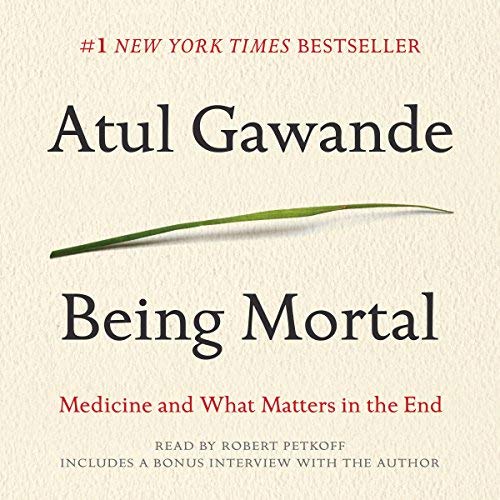Being Mortal: Medicine and What Matters in the End
Atul Gawande, 2014
–Review by Landrum P. Leavell III, Th.D.
This book has absolutely nothing to do with the art of preaching. It has everything to do with the stories of those to whom we preach, for whom we care, and with whom we interact.
Atul Gawande is the author of three best-selling books, a surgeon in Boston, a staff writer for The New Yorker, and a professor at Harvard Medical School and the Harvard School of Public Health. He has given all pastors, preachers, and parishioners counsel, insight, and input into end-of-life issues and realities that is both informative and disconcerting. The gift of clarity is hard to overstate.
According to this physician/surgeon, doctors are trained to fix things. If they can’t fix something, they don’t know what to do except to keep trying things. “Those of us in medicine…often regard the patient on the downhill as uninteresting unless he or she has a discrete problem we can fix. Medicine’s focus is narrow.”
“Medical science has rendered obsolete centuries of experience, tradition, and language about our mortality and created a new difficulty for mankind: how to die.”
“Everyone struggles with this uncertainty—with how, and when, to accept that the battle is lost… How do you attend to the thoughts and concerns of the dying when medicine has made it almost impossible to be sure who the dying even are?”
“This is the modern tragedy, replayed millions of times over… We imagine that we can wait until the doctors tell us that there is nothing more they can do. But rarely is there nothing more that doctors can do.”
Gawande has dozens, if not hundreds, of cases and conversations with people cited as evidence of the things he is talking about. The “problem coin” has two sides: most patients don’t ask questions or enough questions, and doctors are in a hurry and need to move on. Here’s another big one—97% of medical graduates do not have a single course in gerontology. Think about that. Many of the schools that teach it are going out of business because it’s not wanted. And doctors who have training in geriatrics don’t want to advertise it for fear of getting too many elderly patients. Why you ask?
Because when an elderly patient comes to see the doctor, by the time they actually go, they may have been juggling five or six things for ten years. So it takes time to question through the layers of life, schedule, nutrition, exercise, et al. That might take 45 minutes or more. Interestingly, they always check their feet. Why? Because they can’t get to them. They might have sores between toes due to diabetes or other issues and need to see a podiatrist twice a month.
Dr. Gawande has more than just street cred from his office or hospital. He’s a doctor, and his parents were also doctors. All of the difficulties and reticence to have the hard conversations and knowing when to let go, he dealt with himself. He knew all the things and had had the conversations with patients over the years, but he still had difficulty having those same conversations with his Dad when he started the downhill. And his Dad knew them as well. So when he writes, “I have seen the damage we in medicine do when we fail to acknowledge that such [our] power is finite and always will be,” it carries a weight most don’t know and/or cannot fathom.
This is about more than having a DNR (Do Not Resuscitate). By his admission, doctors think their “job is to ensure health and survival. But it is really larger than that. It is to enable well-being. And well-being is about the reasons one wishes to be alive.” And those reasons don’t just matter at the end of life but all along the way. The vital questions are the same, whether the serious sickness or injury strikes your mind or body. Today this is known as the field of palliative care:
- What is your understanding of the situation and its potential outcomes?
- What are your fears and what are your hopes?
- What are the trade-offs you are willing to make and not willing to make?
- And what is the course of action that best serves this understanding?
Gawande supplies a lot of history given related to how we got to where we are today, from “poorhouses” before 1935 to the beginnings of “assisted living” in 1983, to how that got hijacked by the nursing home movement, and on to hospice care. The look backward is extremely helpful to the forward view.
“Sometimes we can offer a cure, sometimes only a salve, sometimes not even that. But whatever we can offer, our interventions, and the risks and sacrifices they entail, are justified only if they serve the larger aims of a person’s life. When we forget that, the suffering we inflict can be barbaric. When we remember it, the good we can do can be breathtaking.”
Being Mortal is chock-full of stories of real people as well as family members who are walking these roads, roads that pastors and preachers will walk literally and pastorally. I cannot recommend this one enough.
You’re welcome.

